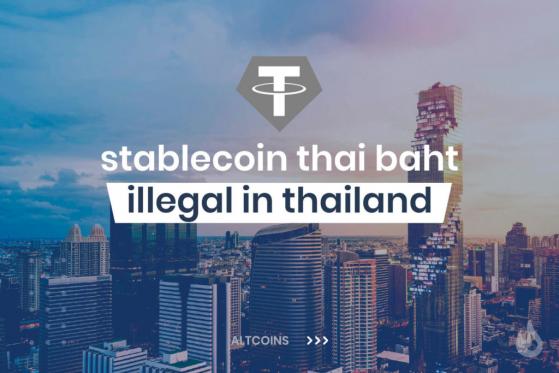Stablecoins have been introduced into the crypto space to provide a store of value and reduce market volatility, making them an indispensable asset for any trader. While individuals understand and appreciate the advantages they bring into the market, some regulatory systems and governmental institutions, such as the Bank of Thailand (BOT), have confronted the growing demand for stablecoins by declaring them illegal.
Used to bridge the gap between fiat and cryptocurrency, stablecoins have innovated how trading and transactions occur through the network of people and exchanges. The demand for stablecoins has increased due to an expansion in exchanges, most notably decentralized exchanges that make crypto transactions much more accessible.
Terra (LUNA) And The Thai Issue
A Thai baht equivalent was minted on the Korean stablecoin platform Terra (LUNA), also known as Terraform Labs, which runs on the Anchor Protocol. In principle, Terra offers the means to create cryptocurrencies pegged to the world’s leading currencies such as the USD, EUR, or others. The company’s goal is to retain purchasing power on the Terra Alliance network, which operates multiple e-commerce companies, by creating country-specific coins to utilize on their network.
The creation of the algorithmic THT, a one-on-one equivalent of the Thai baht, has caused the central Bank of Thailand to respond. The digitally-pegged currency, which mimics the baht’s price and movement, has been deemed illegal. A BOT representative invoked a violation of Section 9 of the nation’s Currency Act (1958).
The BOT has argued that their decision was well-founded, based on their analysis, as it could “cause fragmentation to the Thai currency system.” However, the token is only transacted on currency exchanges.
The case of stablecoins creating rifts between issuers and governmental bodies is nothing new. For example, Facebook’s Diem (formerly Libra) stablecoin caused concerns in the US, Germany, and France. Regulators fear that a digital token pegged on a one-to-one basis could affect the financial system’s stability, and therefore they believe it needs tougher regulation.
Stablecoins generally are facing harsh scrutiny, as direct competition could lead to a crack in the current monetary system. According to an EU report, stablecoins could be redundant if central banking systems implement a DLT to track transactions and use it as an untampered record of data.
On the Flipside
- An aggressive stance on stablecoins despite their ongoing adoption could hurt Thailand’s reputation among crypto investors.
- Stablecoins can have a harsh impact on the economy if not sufficiently regulated.
- Terra (LUNA) gained free exposure from their endeavor, but it could hurt their expansion into Thailand.
Thailand’s Exposure To Cryptocurrency
The BOT’s harsh stance toward the emergence of THT stablecoin contradicts the direction of Thailand’s evolution into the cryptocurrency space. The country’s rules and regulations are generally relatively open to cryptocurrency users.
Blockchain adoption is growing in Thailand, and even the BOT has implemented an IBM (NYSE:IBM) blockchain solution, helping usage spread across the country. Blockchain adoption only comes from increased regulations by governing bodies, and Thailand has created a safebox of good practices to increase blockchain usage further. As a result of the new rules, there are currently a total of 15 exchanges operating in the country.
Thailand’s government has gone one step further and is examining promoting Thailand to Japanese cryptocurrency owners and users. According to a study, 11% of Japanese hold Bitocin, while the global average is between 7-8%. To attract “younger, wealthier” visitors, Thailand is examining implementing crypto payments at popular tourist destinations.
However, Thailand’s SEC recently proposed a new regulation requiring cryptocurrency investors to have minimum capital of 1 million baht ($33,000 USD). The proposals sparked outrage among the crypto community in a country whose GDP per capita is only $7,800, as the minimum level would have been beyond the means of most potential investors.
As a result of the backlash, the regulator withdrew its proposals. The SEC’s secretary-general, Ruenvadee Suqanmongkol, is still, however, stressing the importance of regulation to protect new investors, who may not be well-informed about risks. She has stated, “If the SEC just stands by and does nothing, it would be totally our responsibility if investors lose on cryptocurrency.” The SEC is concerned that Thai investors could encounter significant financial losses due to volatility and their lack of knowledge of cryptocurrencies.
